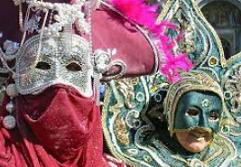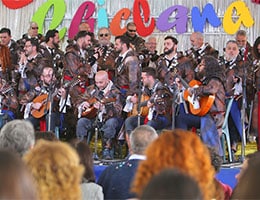 The term carnival , coming from the Italian language, refers to the three days that precede the beginning of Lent (the liturgical period characterized by penance, which serves as preparation for Easter ). In this case, carnival can also be written with a capital letter: Carnival .
The term carnival , coming from the Italian language, refers to the three days that precede the beginning of Lent (the liturgical period characterized by penance, which serves as preparation for Easter ). In this case, carnival can also be written with a capital letter: Carnival .
Carnival is called, therefore, the celebration that takes place in the days before Lent . This begins with Ash Wednesday , which does not have a fixed date. That is why the carnival is celebrated between February and March, depending on each year .
At the carnival there is usually music, dancing and a parade of comparsas (groups of musicians and dancers). People, in turn, use masks and various costumes . It is a popular celebration that takes place in the streets , parks and other public spaces.
The use of masks and costumes was, in its beginnings, linked to modesty. People from all social classes sought to have fun beyond the conventions and rules that governed the community: in this way, they tried to hide their identity on carnival days. Over time, masks became a central element of these celebrations.
The carnival in Rio de Janeiro ( Brazil ) is considered the largest on the planet. There are sambadromes there, which are special places where the troupes parade and the public dances. The Barranquilla Carnival ( Colombia ), the Oruro Carnival ( Bolivia ) and the Binche Carnival ( Belgium ) are other important celebrations that are also part of the World Heritage Site protected by UNESCO .
Shrove Tuesday
 The Christian Calendar, also called liturgical , is what Catholics use to organize the different periods of spiritual life. It indicates Shrove Tuesday (or Pancake Tuesday ) to refer to the final day of Carnival, that is, the one preceding Ash Wednesday .
The Christian Calendar, also called liturgical , is what Catholics use to organize the different periods of spiritual life. It indicates Shrove Tuesday (or Pancake Tuesday ) to refer to the final day of Carnival, that is, the one preceding Ash Wednesday .
There are enough documents and records to know with certainty that these celebrations originated in pre-Christian times, where they were pagan festivals that were organized according to the phases of agricultural activities and the change of season. Currently, Carnival is celebrated in many parts of the American and European continents.
Regarding the date of Carnival, it varies every year, since it must be located forty days before Palm Sunday (when the arrival of Jesus in Jerusalem is commemorated) and is not linked to the Gregorian calendar, but to the ancient solar calendar. mole. Christians place this Sunday one week before Easter, which must always be in the period from March 22 to April 25; Hence Shrove Tuesday is always between February 3 and March 9 (in leap years , one day later if it falls in February).
Depending on the country, Shrove Tuesday has different names, including "Fat Tuesday", "Confession Tuesday", "Fast Eve" and "Pancake Day". The latter, used in New Zealand, Australia, Canada and the United Kingdom, refers to the fact that pancakes are usually prepared before the liturgical fast of Lent to consume all the foods that are not recommended during this season, such as sugar, eggs and milk.
In Belgium, this date is celebrated in the context of the Binche Carnival, one of the most important in Europe; in Germany, during the Cologne Carnival, of great national relevance. For their part, Italians have several carnivals that are spread throughout their geography , among which those in Venice and Viareggio stand out.
